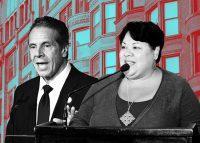The long-percolating broker fee bill in New York City is one step closer to realization.
The bill landed a spot on the New York City Council’s Democratic conference agenda on Tuesday, Crain’s reported. While that’s a far cry from the legislation being passed and signed into law, it’s typically a good sign for the bill’s prospect of being passed.
Nearly two-thirds of the City Council supports the legislation; the bill only needs one more supporter to hit a veto-proof supermajority on the possibility of the mayor rejecting the law. Still, City Council Speaker Adrienne Adams hasn’t made her position clear or put the bill up for a vote, and a vote may not be imminent.
Championed by Council Member Chi Ossé, the bill would require landlords who hire rental brokers to be responsible for the broker fees. That would shift the burden away from tenants, who often need to pay the landlord’s broker up to 15 percent of the annual rent to secure a lease.
The real estate industry, including the Real Estate Board of New York, has rallied against the bill. The trade group’s argument is that the rule change would not only reduce brokers’ incomes, but also hurt tenants because landlords would bake the commissions costs into rent, elevating payments.
Ossé has balked at those arguments, claiming landlords can’t hike the rents in any dramatic fashion at rent-stabilized apartments and that the market will still dictate rents at others.
The latest iteration of the bill added more tenant protections and expanded the Department of Consumer Affairs’ enforcement powers.
Broker fees have been a topic of discussion for elected officials for years. In 2019, Council Member Keith Powers proposed capping fees at about 8.3 percent. That was later amended to specify that if the broker was hired by the landlord, renters would pay a commission of, at most, one month’s rent. Brokers balked and the bill lost steam.
In 2020, the Department of State issued guidance interpreting the 2019 rent law as a ban on tenants being required to pay broker fees. The Real Estate Board of New York, New York Association of Realtors and 12 brokerages filed a lawsuit alleging that the agency had overstepped. A state court agreed with them.
This go-around may be hard to stop, though. As one broker told Crain’s, “Within the brokerage community, there seems to be more of a sense that this is probably going to happen, so let’s deal with it.”
Read more



